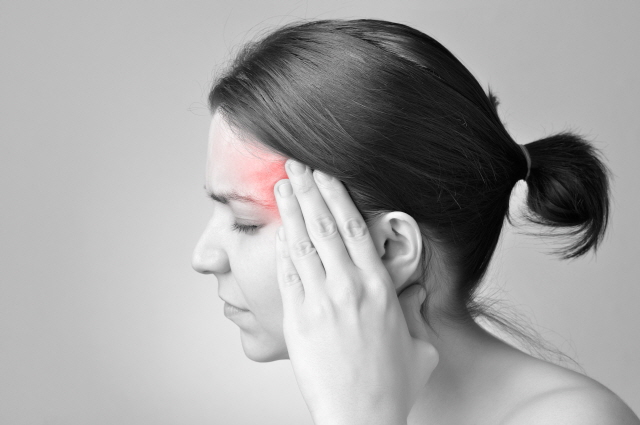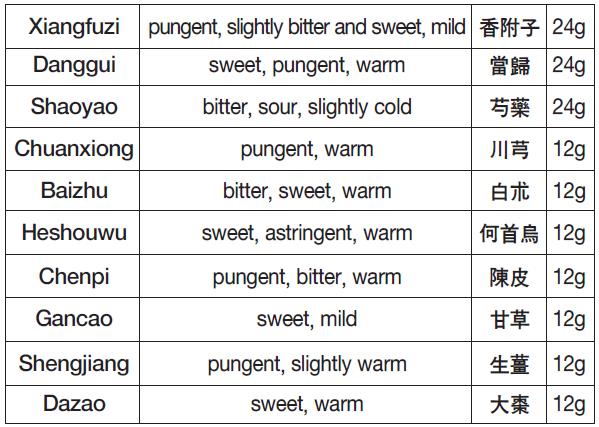
The Formula Tend To Be Prescribed For Females With Too Many Thoughts and Worries.
By Jubong Kang, KMD
Actions and Diagnosis
This prescription treats headaches due to the syndrome of liver-qi stagnation caused by qi-stasis by tension and stress. These headaches are more common in women than men; they are not intense but persistent, sometimes somewhat severe and less and cannot be healed easily for a long time.
Too much concern and thought creates excessive heart heat. And in constant exhaling with heat through breathing, the upper energizer tends to be dried. Therefore, the blood becomes thicker or drier, and blood vessels become tensed and contracted. It explains how the headache started among the patients.
This prescription improves symptoms such as the dry mouth and tongue, bloating and pressure pain at the epigastrium, lower abdomen pain, numb limbs, coldness in the hands and feet, menstrual pain or irregularity, and headache.
In the source text “Dong Yi Su Se Bo Won,” this prescription was made for Shaoyin-type, but if there is a pattern of liver-qi stagnation caused by qi and blood stasis, it could be recommended for all body types.
It was made by combining the two prescriptions, removing Suye from Xiangsu-San, removing Shudihuang and Fuling from Bawu-Tang (Bazhen-Tang), and adding Heshouwu.
In this prescription, Xiangfuzi is a monarch drug that disperses and regulates stagnated liver-qi to resolve emotional and psychological repression. It normalizes the flow of stagnated qi and blood in the liver, spleen, and the three energizers, so this drug improves distending pain at the hypochondrium, epigastric pressure pain, headaches, menstrual pain, tinnitus, vertigo, and others.
Danggui and Shaoyao work as minister drugs, supplementing and activating blood circulation. Although Xiangfuzi can improve and regulate the flow of qi and blood, it needs the assistance of Danggui and Shaoyao to treat blood stasis due to liver-qi stagnation.
Danggui relieves vertigo, palpitation, menstrual irregularity and pain caused by blood deficiency or blood stasis; Shaoyao recovers the lack of yin-blood in the liver and inharmony between the liver and spleen to alleviate the pains of the hypochondrium, epigastrium, and middle abdomen; and then both drugs aid Xiangfuzi to resolve liver-qi stagnation.
Chuanxiong, Baizhu, Heshouwu, Chenpi, Shengjiang, and Dazao act as adjuvant drugs; and Gancao works as an adjuvant and Guiding drug with Shengjiang and Dazao. Chuanxiong activates blood circulation and improves stagnated blood, so it helps Danggui and Shaoyao to relieve headaches, hypochondriac pain, and menstrual pain.
And it helps Xiangfuzi by regulating qi in the blood. Baizhu tonifies the spleen, benefits qi, promotes diuresis and drys dampness-phlegm to recover vertigo and headache. Heshouwu alleviates headaches and vertigo caused by the lack of blood and essence in the liver and kidney and assists in improving neurological symptoms.
Chenpi has functions of regulating qi, drying dampness, and eliminating phlegm, which dissolves qi-stagnation and relieves headache and vertigo as supporting the monarch and minister drugs.
Shengjiang warms the stomach and dissipates phlegm, and Dazao replenishes nourishment to the spleen and calms the mind, so these two drugs aid in treating headaches while modulating the spleen and stomach.
Gancao becomes an adjuvant drug that exerts a benefitting qi and also acts as a guiding drug that mediates the effects of other drugs by its sweet flavor. Shengjiang and Dazao also serve as adjuvant and guiding drugs along with Gancao because they regulate other drugs by their pungent and sweet flavors.
As for the condition of abdominal diagnosis, there is Xiangfuzi, so pressure pain and slight swelling appear in the epigastrium. In addition, because there are Dangui, Chuanxiong, and Shaoyao, hypertonicity appears weak or strong in some cases when the left below or below the navel is palpated.
The pulse is normal, and if the pulse is powerful, it should be added with digestive-promoting drugs or purgative. Otherwise, another prescription has to be chosen.
Contents in the Source Text
This prescription treats mild headaches with a dry throat and tongue caused by damage to the spleen when females have a lot of thoughts and concerns. (“Dong Yi Su Sw Bo Won”)
Application
Chronic headache, dry throat and tongue with headache, epigastric inflation and pressure pain with headache.
Distinction
Banxia-Baizhu-Tianma-Tang : This prescription is frequently used for vertigo and headaches, and epigastric glomus appears in the abdominal diagnosis, but pressure pain and inflation are not so severe as in Xiangfuzi-Bawu-Tang.
<Ingredients>
































